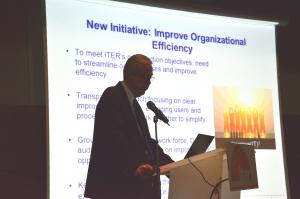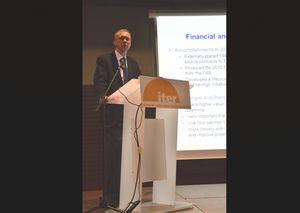The year 2011 was a whirlwind of activity for the Department for Administration in which we had the benefit of three Management Advisory Committee meetings, two ITER Council meetings, two Financial Audit Boards and—last but not least—the Management Assessment Review. The good news is that all the reviews recognized significant progress in how we are doing our work. But we can do better!
Therefore, in 2012 our overarching aim will be to improve the project's performance and efficiency. ITER has grown up from the ground and now the organization and infrastructure to deliver the construction project is established. The organizational future lies in completing the construction of ITER in a manner that is safe, and which offers best value for money by incorporating measures and processes for operational excellence.
That is why we have triggered a new initiative based on the value of simplicity with the goal of improving the project's efficiency. The key element of this initiative is to build on the knowledge and experience of our workforce. Everyone who works for and with us is encouraged to constantly look for opportunities to simplify our procedures and practices.
This new initiative is being identified with the anagram "Improve(IT)².'' Improve by continuously asking yourself if you can do something more simply and either do it or report it, while remembering to always:
• Be impartial by being objective and making decisions based on unambiguous and defined rules;
• Take individual responsibility and accountability for deliverables;
• Trust your colleagues (ITER Organization and Domestic Agency) to do a good job and don't duplicate their work;
• Be a team player by working early in the process to help your colleagues achieve success. Welcome your colleagues' help.
The ideas may come from an individual, team or group within the organization or from internal or external audit reports. So far as is possible, the improvements should be acted upon locally and communicated so others can learn from the improvement achieved.



